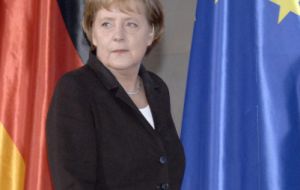MercoPress. South Atlantic News Agency
World shares fall after surprise move by Germany to limit short-selling
 Chancellor Angela Merkel political problems spill to financial markets
Chancellor Angela Merkel political problems spill to financial markets World shares fell on Wednesday after a surprise move by Germany to ban some types of short-selling of financial products. Bans on short selling have been introduced in recent times of financial instability by both the UK and US.
And there were fears the Berlin move to limit short-selling could indicate more bad news lurking in the Euro zone. That in turn has led to uncertainty, as investors mull the impact of any Euro zone instability on wider markets.
Key share indexes in London, Paris, and Frankfurt lost close to 3%. On Wall Street the Dow Jones fell by 0.63%. Earlier, the Euro hit another four-year low against the dollar. It fell to $1.214 before recovering to $1.239.
In London the FTSE was down by 2.8% at 5158.08 points, and the falls were mirrored by drops in France and Germany. At the close in Paris the Cac 40 was 2.9% lower at 3,511.67, and in Germany the Dax closed behind by 2.7%, at 5,988.67.
In Latinamerica the main markets followed the trend with Brazil’s Bovespa down 1.89%; Argentina’s Merval, 0.22%; Mexico’s IPC, 0.46% and Chile’s IPSA, 0.14%.
Some analysts believe the German government made the short-selling move after domestic pressure on Chancellor Angela Merkel, who has faced criticism over her response to the Greek debt crisis.
On Wednesday in a debate about Germany's part in the multi-billion euro bail-out of Greece she warned politicians that strict financial regulation was needed to ensure the survival of the Euro zone.
The German financial regulator has banned traders in the country from “naked” short-selling of euro-denominated government bonds and of shares in the country's 10 most important financial institutions.
Short-sellers usually borrow shares, sell them, then buy them back when the stock falls and return them to the lender, keeping the difference in price.
“Naked” short selling occurs when a trader sells a financial instrument that has not yet been borrowed.
The German ban will run from 19 May to 31 March 2011. It will also apply to the use of credit derivatives to bet on a fall in the value of the debt of a Euro zone government, unless the investor owns some of the relevant debt.
Credit default swaps are financial derivatives that provide insurance for losses if a borrower goes bankrupt, and have become a lucrative trading market.
Germany's market regulator, Bafin, said that the “extraordinary volatility of the bonds of Euro zone states” had justified the short-selling ban.
However, many are questioning whether Bafin's actions will have much impact unless other regulators do the same, given that the trading of government bonds and bank shares is a global business.
European Commission President Jose Manuel Barroso said on Wednesday that other regulators should take similar action.
“We are in agreement with Germany on the need to halt the abusive use of naked short selling,” he said.
Earlier the EU commissioner for the internal market and financial regulation, Michel Barnier, said a task force was already looking into issues including naked selling.
Meanwhile, US regulators have proposed new trading restrictions to try to avoid a repeat of the plunge in values suffered earlier this month.
On 6 May, the market fall quickly spread out of control, and so the Securities and Exchange Commission (SEC) is now proposing so-called “circuit breakers”.
These would halt trading in a stock for five minutes if it fell more than 10% in five minutes. The new rules would apply to all stocks in the Standard & Poor's 500 index.




Top Comments
Disclaimer & comment rulesCommenting for this story is now closed.
If you have a Facebook account, become a fan and comment on our Facebook Page!